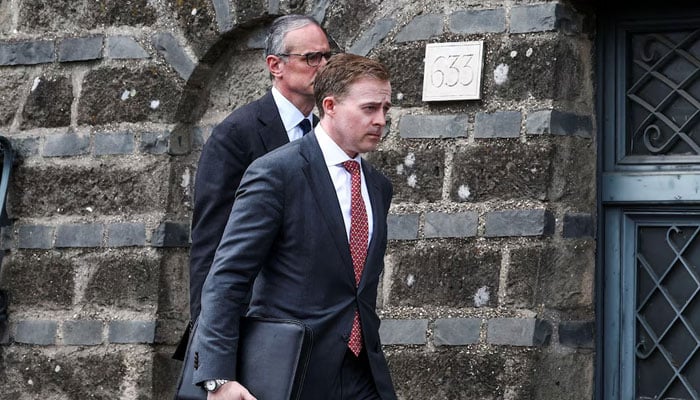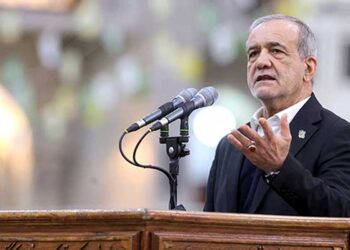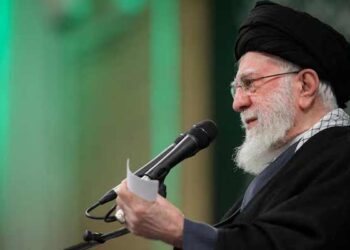Select Language:
- Negotiators from Iran and the US to address nuclear tensions in Rome.
- Conflicts over uranium enrichment throw discussions into uncertainty.
- Iran asserts it will hold the US accountable for any Israeli incursions.
DUBAI: On Friday, Iranian and American negotiators are set to continue discussions in Rome, aiming to find common ground on Iran’s nuclear program, despite severe warnings from Tehran’s supreme leader that achieving a renewed agreement may be impossible due to conflicting demands.
The outcome is critical for both nations: President Donald Trump is focused on limiting Iran’s ability to develop nuclear weapons that might provoke a nuclear arms race in the region, while Iran seeks relief from the crippling sanctions impacting its oil-dependent economy.
Iranian Foreign Minister Abbas Araqchi and Trump’s Middle East envoy, Steve Witkoff, will engage in a fifth round of talks, facilitated by Omani mediators. This comes amidst both Washington and Tehran publicly adopting a hardline approach regarding Iran’s uranium enrichment activities.
While Iran maintains that the discussions are indirect, US officials have stated that these talks—including the latest round on May 11 in Oman—have included both direct and indirect elements.
Araqchi, who arrived in Rome with two of his deputies, shared on X: “…Zero nuclear weapons = we have a deal. Zero enrichment = we do NOT have a deal. It’s time to make a decision.”
White House Press Secretary Karoline Leavitt informed reporters on Thursday that Trump believes the negotiations with Iran are “progressing in a positive direction.”
Both Tehran and Washington have expressed a preference for resolving the deadlock through diplomacy. However, they remain significantly divided over several key issues that negotiators must navigate to reach a new nuclear agreement and prevent potential military action.
US Secretary of State Marco Rubio stated on Tuesday that the goal is to form a deal allowing Iran to maintain a civilian nuclear energy program without uranium enrichment, though he acknowledged that accomplishing this will be challenging.
Supreme Leader Ayatollah Ali Khamenei, who has final authority on Iranian matter, dismissed US demands to cease uranium refinement as “excessive and outlandish,” indicating that the negotiations are unlikely to be successful.
One significant point of contention is Tehran’s refusal to export its stockpile of highly enriched uranium, a potential component for nuclear weapons, or to engage in discussions about its ballistic missile program.
Iran claims it is willing to accept some restrictions on enrichment, which it argues is solely for civilian energy purposes, but it demands firm assurances that Washington will honor any future nuclear agreement.
Since February, Trump has intensified a campaign of “maximum pressure” on Tehran, having abandoned the 2015 nuclear agreement during his first term in 2018 and reinstating sweeping sanctions that continue to cripple the Iranian economy.
In response, Iran has escalated its uranium enrichment beyond the limits set by the 2015 agreement.
Wendy Sherman, a former US Undersecretary of Political Affairs who was part of the negotiating team for the 2015 agreement, remarked that convincing Iran to dismantle its enrichment program is unrealistic—an essential aspect of Iran’s sovereignty.
“I don’t think we can achieve an agreement with Iran where they completely dismantle their program and abandon enrichment, even though that would be the ideal scenario,” she told Reuters.
The consequences of failure in the negotiations could be severe. While Tehran insists that its nuclear activities are peaceful, its main rival, Israel, does not accept this narrative, asserting that it could never allow Iran’s clerical regime to acquire nuclear weapons.
A source informed Reuters that Israel’s Minister of Strategic Affairs and the head of its foreign intelligence service, Mossad, will also be present in Rome for discussions with the US negotiating team as they engage with Iran.
On Thursday, Araqchi warned that if Israel were to strike Iranian nuclear installations, Washington would bear legal responsibility, following reports that Israel might be planning military action.
Although rising tensions between the US and Iran over enrichment issues have cast doubt on the nuclear negotiations, three Iranian sources indicated on Tuesday that the clerical leadership lacks a clear alternative if efforts to resolve the standoff fail.







